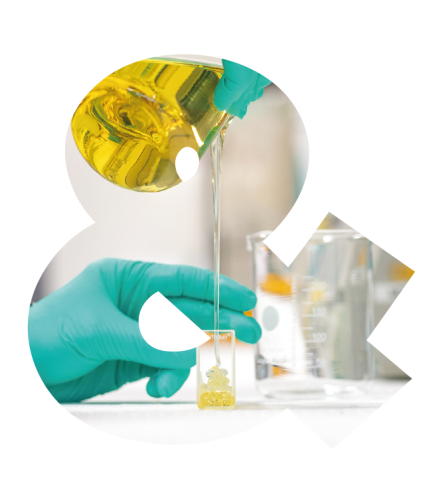Supporting sustainable farming & responsible practices
Copy the URL
Copié vers le presse-papier
Avril - supporting sustainable farming & responsible practices
Encouraging new value-creation outlets for upstream agriculture
By developing solutions with low greenhouse gas emissions, Avril is creating value for crop and livestock farmers in local regions, to the benefit of both consumers and the planet.
Championing responsible practices through OleoZE
The Group’s ambition is to champion agriculture as a solution to climate change, and to restore the competitiveness of oilseed crop farming by providing financial support for best practices among farmers.
In 2023, Saipol pursued the implementation of a strategy based on sustainability, traceability and recognizing the value of agricultural best practices. In a constantly evolving regulatory context and an uncertain biodiesel market, Saipol continued to purchase low-carbon oilseeds via OleoZE, with volumes plateauing this year at 135,000 metric tons, resulting in an average GHG reduction of 97% compared to fossil fuels.
Saipol also moved forward with the development of its OleoZE plant, and is working to make its expertise in low-GHG biofuels available to other business units, in order to provide upstream and downstream support for decarbonization and regenerative agricultural practices.
5 years of valorization
700k
of sustainable seeds sold
29€/t
average GHG bonus payout
20 M€
in payouts to upstream agriculture
135k
of seeds collected in 2023
In Romania, Expur draws inspiration from OleoZE
In 2021, Expur, an Avril business unit in Romania, launched a project to encourage responsible practices and promote sustainable agricultural production, in the form of bonuses paid to Romanian farmers who sign up to the scheme. In Romania, this incentive is provided in recognition of practices combining reduced tillage with responsible, appropriate use of fertilizers and fuel.
Supporting agroecology via the "Committed Oils" initiative
Lesieur has initiated a collective and innovative approach involving a range of stakeholders in the rapeseed and sunflower sectors: FOP farmer members, storage organizations, Saipol for crushing, Sofiprotéol to structure the supply channel, Terres Innovia for on-the-ground expertise, and an independent third party (DNV) to validate the approach.
The objective is to facilitate the development of more robust rapeseed and sunflower plantations that consume fewer resources and respect biodiversity and the environment, by establishing a set of specifications based around twelve criteria.
This approach addresses the expectations of consumers who wish to reduce their environmental impact with more responsible produce. As a leader in its sector, Lesieur has chosen to champion responsible agricultural practices, rewarding farmers’ commitment with adjusted compensation for its Cœur de Tournesol and Fleur de Colza ranges.
Lesieur is seeking to unite as many farmers as possible under the “Committed Oils” initiative, and to support them as they transition toward greater sustainability. The company has developed and upgraded its charter of agricultural best practices alongside the various stakeholders involved in the project, with the goal of allowing each partner farmer to select at least three “committed” practices to implement, while also taking into account the specific conditions of their farm (region, soil, water, crops, etc).
The "committed oils" approach in figures
20ML
of Lesieur Cœur de Tournesol and Fleur de Colza oils to be produced in 2024
42k
metric tons of "committed" sunflower seeds and rapeseed harvested in 2023
+500
partner farmers in France
+17k
hectares of rapeseed and sunflower plantations generated by the initiative
Contributing to the decarbonization of cattle farming
Via its Solutions for Agriculture branch, Avril supports livestock farmers in optimizing their profitability while also reducing the environmental impact of their operations: two challenges which may appear contradictory, but are in fact directly correlated. Avril notably supports cattle farming and develops solutions that contribute to the reduction of greenhouse gas emissions, in particular the reduction of methane emissions by ruminants, which are primarily caused by enteric fermentation.
Reducing emissions from ruminants requires specific expertise in animal nutrition, and Sanders is working in partnership with Feed Alliance and MiXscience to offer solutions capable of addressing this challenge, and of guaranteeing responsible supply. The end goal is to support a sustainable French livestock sector, and thereby to avoid importing meat sourced from animals whose nutrition might contribute to deforestation and whose transport results in GHG emissions.
As the national leader in animal nutrition in France, we have a responsibility to take concrete action to decarbonize livestock farming, without decapitalizing the French herd. We believe in the future of livestock farming in France and the polyculture livestock-farming model in our regions. We want livestock farmers to live well and thrive in their profession. We must find new ways to create vocations, and encourage facilities and transmissions. Working to curb imports by maintaining and developing French livestock farming also means helping to decarbonize livestock farming worldwide!
Philippe Manry
General Manager of Sanders
Putting tomorrow in your hands: the Sanders CSR strategy
In 2023, Sanders defined its CSR ambitions, which are now fully integrated into its strategy and reflect the message of its new slogan: Putting tomorrow in your hands.
Tackling the challenge of decarbonizing livestock farming
- Reducing our GHG emissions by 30% by 2030
- Reducing GHG emissions in livestock farming
- Accelerating the decarbonization of the protein sector
- Innovating for eco-friendly animal nutrition
Fostering both animal and farmer welfare
- Certifying our partner livestock farms
- Promoting physical and mental wellness for livestock farmers
- Integrating virtuous livestock farming practices as a component of livestock farmer compensation
Creating value for women, men and regions
- Representing, defending and promoting livestock farmers
- Creating and sharing value throughout the regions
- Strengthening dedicated dialogue and closer links with livestock farmer clients
- Banking on the value of inclusion
Accelerating the Group's decarbonization
Avril’s climate strategy and its greenhouse gas emissions reduction trajectory for 2030 were validated in 2023 by the Science Based Targets Initiative* (SBTi). This strategy is based on both mitigating and adapting to the effects of climate change – two mutually beneficial approaches to achieve the ambitious objectives the Group has set itself.
*The Science Based Targets initiative is a partnership between the CDP, the UN Global Compact, the World Resources Institute (WRI) and the World Wide Fund for Nature (WWF), an initiative created following the Paris Agreement in order to engage economic stakeholders in the decarbonization process.
Addressing the causes
Mitigating climate change involves taking action to address its causes, with priority being given to greenhouse gas emissions. In Scopes 1 & 2, which involve direct emissions from Avril operations, each business unit has implemented a roadmap designed to reduce sources of energy consumption that have the greatest impact on the carbon footprint.
This expansive undertaking covers all industrial sites operated by the Group that consume natural gas and electricity, which represents around 270 kt of annual CO2 emissions. Studies were launched in 2023 to identify the main sources of waste, supplementing measures already put in place (an energy management system and programs to increase awareness around energy savings).
In figures
30% target of reduction in GHG emissions for Scopes 1 & 2 by 2030, compared with the reference year 2019. It also refers to the goal of reducing emissions per metric ton of product manufactured in Scope 3 over the same period.
Since 2022, Avril has had its own Climate Steering Committee whose members are directly involved in decarbonization efforts, supervised by several members of the Executive Committee. This committee provides a framework for the Group's climate strategy, and monitors its objectives.
Clément Tostivint
Avril CSR Director
In Scope 3, which covers emissions generated by the Avril value chain (primarily supply and transport operations), the objective is to contribute to reducing greenhouse gas emissions in the agricultural sectors we work with. This is achieved through innovative initiatives such as OleoZE, or Lesieur’s “Committed Oils”, which incentivize responsible, low-carbon farming practices.
Addressing impacts
Adaptation involves evaluating our vulnerability to the impacts of climate change, in order to identify solutions that will enable us to contend with a changing climate. Efforts began with two studies launched in 2023 for the 2030 and 2050 timeframes, in order to lay the foundations for a forthcoming adaptation plan.
The first study focused on the assessment of climate risk at our industrial sites: those located in the USA, Malaysia and in North Africa proved to be particularly exposed, and will require targeted investment in the coming years.
The second looked at oilseed farming in France: summer crops (sunflower, soya) are particularly at risk from extended periods of dry weather, with significant variabilities across different regions. The objective is to be able to share our conclusions with upstream agriculture, and to work together to define a suitably adapted plan of action.
In order to decarbonize electricity and steam consumption at the Expur factory in Romania, a new cogeneration plant will enable the site to power itself with green electricity for 92% of consumption, and 100% of its steam consumption. This cogeneration runs completely on sunflower hulls shelled in the plant.
Philippe Granger
Head of Energy, Avril








